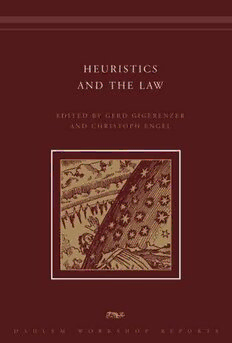
Heuristics and the Law (Dahlem Workshop Reports) PDF
502 Pages·2006·2.246 MB·English
Most books are stored in the elastic cloud where traffic is expensive. For this reason, we have a limit on daily download.
Preview Heuristics and the Law (Dahlem Workshop Reports)
Description:
In recent decades, the economists' concept of rational choice has dominated legal reasoning. And yet, in practical terms, neither the lawbreakers the law addresses nor officers of the law behave as the hyperrational beings postulated by rational choice. Critics of rational choice and believers in "fast and frugal heuristics" propose another approach: using certain formulations or general principles (heuristics) to help navigate in an environment that is not a well-ordered setting with an occasional disturbance, as described in the language of rational choice, but instead is fundamentally uncertain or characterized by an unmanageable degree of complexity. This is the intuition behind behavioral law and economics. In Heuristics and the Law, experts in law, psychology, and economics explore the conceptual and practical power of the heuristics approach in law. They discuss legal theory; modeling and predicting the problems the law purports to solve; the process of making law, in the legislature or in the courtroom; the application of existing law in the courts, particularly regarding the law of evidence; and implementation of the law and the impact of law on behavior.Contributors:Ronald J. Allen, Hal R. Arkes, Peter Ayton, Susanne Baer, Martin Beckenkamp, Robert Cooter, Leda Cosmides, Mandeep K. Dhami, Robert C. Ellickson, Christoph Engel, Richard A. Epstein, Wolfgang Fikentscher, Axel Flessner, Robert H. Frank, Bruno S. Frey, Gerd Gigerenzer, Paul W. Glimcher, Daniel G. Goldstein, Chris Guthrie, Jonathan Haidt, Reid Hastie, Ralph Hertwig, Eric J. Johnson, Jonathan J. Koehler, Russell Korobkin, Stephanie Kurzenh?user, Douglas A. Kysar, Donald C. Langevoort, Richard Lempert, Stefan Magen, Callia Piperides, Jeffrey J. Rachlinski, Clara Sattler de Sousa e Brito, Joachim Schulz, Victoria A. Shaffer, Indra Spiecker genannt D?hmann, John Tooby, Gerhard Wagner, Elke U. Weber, Bernd Wittenbrink
See more
The list of books you might like
Most books are stored in the elastic cloud where traffic is expensive. For this reason, we have a limit on daily download.
